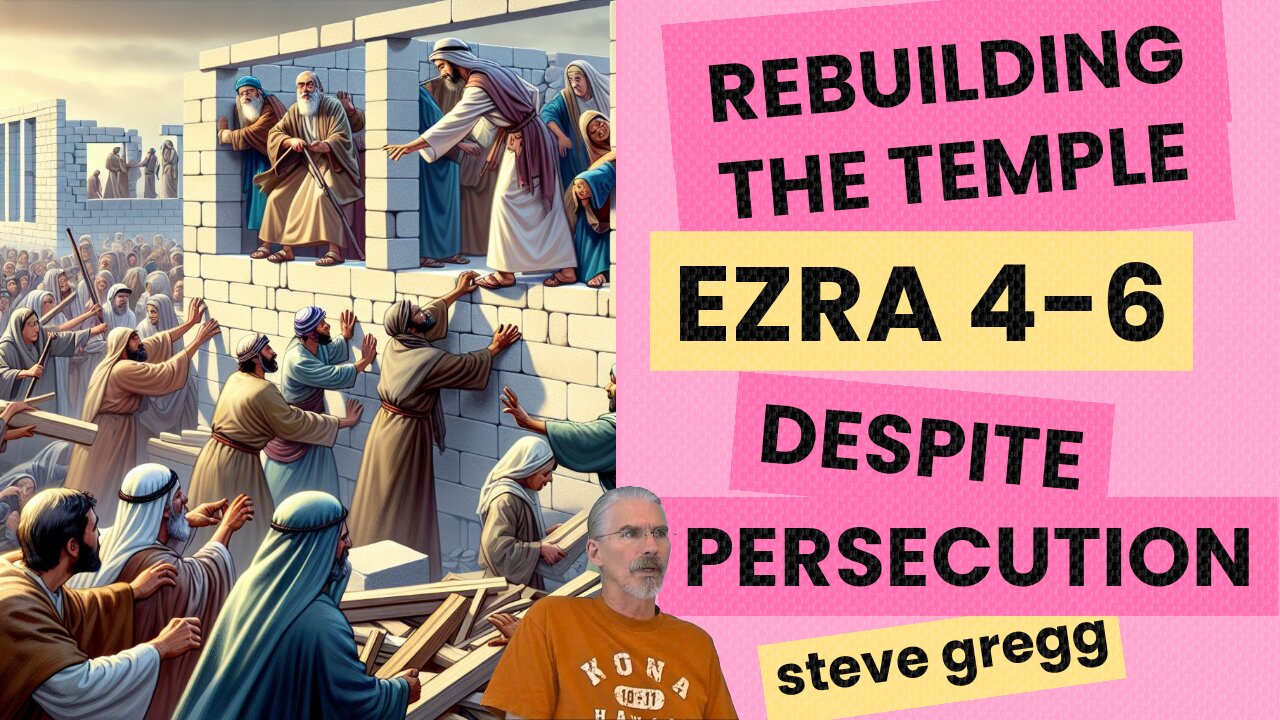Premium Only Content

Ezra 4-6 - Perseverance to Rebuild the Temple Despite Persecution - Steve Gregg
Overview
In this lecture, recorded in 2011, Steve Gregg covers Ezra 4-6, focusing on the challenges faced by the returning Jewish exiles as they rebuild the temple in Jerusalem, the opposition they encounter, and God’s ultimate faithfulness in enabling the project’s completion. His teaching emphasizes the historical narrative, the spiritual lessons of perseverance, and God’s sovereignty over human affairs.
Ezra 4: Opposition to the Rebuilding
Gregg begins with Ezra 4, noting the shift from the initial temple rebuilding efforts in chapters 1-3 to the opposition that arises. He explains that the "adversaries of Judah and Benjamin" (Ezra 4:1) are Samaritans—descendants of foreigners resettled in the region by the Assyrians after the fall of the Northern Kingdom. These adversaries offer to help build the temple, claiming they worship the same God, but Zerubbabel and Jeshua reject their offer (Ezra 4:2-3). Gregg suggests this rejection stems from the Samaritans’ syncretistic religion (mixing Yahweh worship with pagan practices, as described in 2 Kings 17), which the Jews saw as incompatible with pure worship.
He highlights the Samaritans’ subsequent hostility (Ezra 4:4-5), including efforts to discourage the Jews and hiring counselors to frustrate the work throughout Cyrus’s reign. Gregg then addresses the textual shift in Ezra 4:6-23, which he describes as a parenthetical summary of later opposition under kings Ahasuerus (Xerxes) and Artaxerxes. This section, written in Aramaic starting at 4:8, includes a letter accusing the Jews of rebuilding Jerusalem’s walls with rebellious intent, leading Artaxerxes to halt the work (Ezra 4:21). Gregg clarifies that this likely refers to a later period (possibly under Nehemiah), not the temple project under Zerubbabel, but it sets the stage for understanding persistent resistance. He returns to the temple narrative at Ezra 4:24, noting the work ceased until Darius’s reign.
Gregg draws a spiritual lesson: opposition to God’s work is common, often cloaked as cooperation (like the Samaritans’ offer), but discernment and faithfulness are key.
Ezra 5: Resumption of the Work
In Ezra 5, Gregg describes the turning point as prophets Haggai and Zechariah encourage Zerubbabel and Jeshua to resume building (Ezra 5:1-2). He cross-references Haggai 1, where God rebukes the people for neglecting the temple while prioritizing their own homes, suggesting this prophetic push overcomes the earlier discouragement. The Jews restart the work without explicit Persian approval, which Gregg sees as an act of faith.
The Persian governor Tattenai investigates (Ezra 5:3-5), questioning their authority, but Gregg notes God’s protection: “the eye of their God was on the elders of the Jews,” preventing interference. Tattenai sends a letter to Darius (Ezra 5:6-17), asking him to verify Cyrus’s decree. Gregg appreciates the letter’s fairness, as it includes the Jews’ claim that God authorized the temple through Cyrus. He sees this as God working through secular authorities, a recurring theme.
Ezra 6: Completion and Celebration
Gregg’s teaching on Ezra 6 centers on God’s triumph. Darius searches the archives, finds Cyrus’s decree (Ezra 6:1-5), and not only permits the work but funds it with Persian resources, threatening dissenters with death (Ezra 6:6-12). Gregg marvels at this reversal, attributing it to God’s providence—turning opposition into support. He connects this to Proverbs 21:1 (“The king’s heart is in the hand of the Lord”), a principle he often cites.
The temple is completed in Darius’s sixth year (Ezra 6:15), roughly 516 BC, about 20 years after the return. Gregg notes the dedication (Ezra 6:16-18) involves significant sacrifices, reflecting gratitude, though the temple lacks the grandeur of Solomon’s (as Haggai 2:3 implies). The Passover celebration (Ezra 6:19-22) follows, marking a restoration of covenant worship. Gregg emphasizes that this is the first Passover since the exile, symbolizing renewed identity under God’s law, despite Persian rule. He suggests “the king of Assyria” (Ezra 6:22) is a scribal error or symbolic reference to Persia’s dominion over former Assyrian lands.
#ezra #rebuilding #persecution #opposition #rebuildinglife #rebuildinghope #cyrus_the_great #jerusalem #ezra4 #ezra5 #ezra6 #haggai #zechariah #babylon #exile #prophecy #isaiah #daniel #daniel9 #thenarrowpath #stevegregg #70weeksprophecy
-
 54:05
54:05
The Narrow Path
4 months agoThe Sin of Worry - Steve Gregg 7.6.2025
1211 -
 1:25:00
1:25:00
Sam Tripoli
2 hours ago $0.44 earnedPunch Drunk Sports LIVE!
620 -
 55:45
55:45
MattMorseTV
1 hour ago🔴Trump scores 3 VICTORIES in ONE DAY.🔴
4.05K9 -
 LIVE
LIVE
Badlands Media
7 hours agoSITREP Ep. 137
830 watching -
 1:53:04
1:53:04
Barry Cunningham
5 hours agoLIVE BREAKING NEWS: President Trump And Melania Trump Host The National Christmas Tree Lighting
60.4K8 -
 LIVE
LIVE
SpartakusLIVE
2 hours agoHUGE NEW UPDATE - Aim Assist NERF, New META, New MOVEMENT || #1 King of Content
163 watching -
 LIVE
LIVE
Nikko Ortiz
2 hours agoVirtual Reality Milsim... | Rumble LIVE
140 watching -
 1:00:48
1:00:48
BonginoReport
4 hours agoFBI Nabs Jan 6 Pipe Bomber Suspect After 5 Years - Nightly Scroll w/ Hayley Caronia (Ep.190)
134K49 -
 LIVE
LIVE
Sgt Wilky Plays
3 hours agoSweating the Ranked Plays
75 watching -
 LIVE
LIVE
ZWOGs
7 hours ago🔴LIVE IN 1440p! - More PvP and Trials before wipe - ARC Raiders! - Come Hang Out!
62 watching